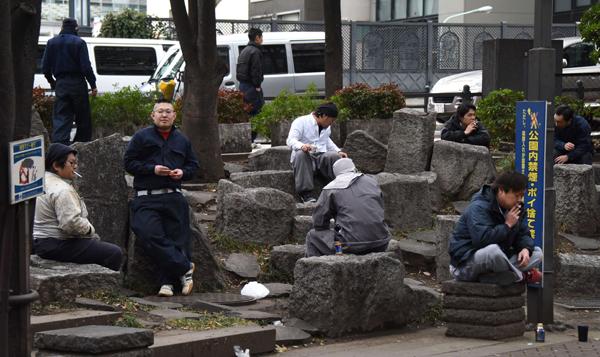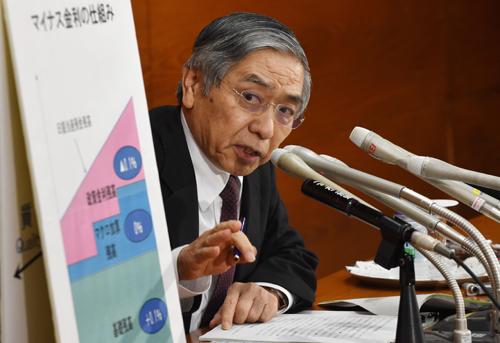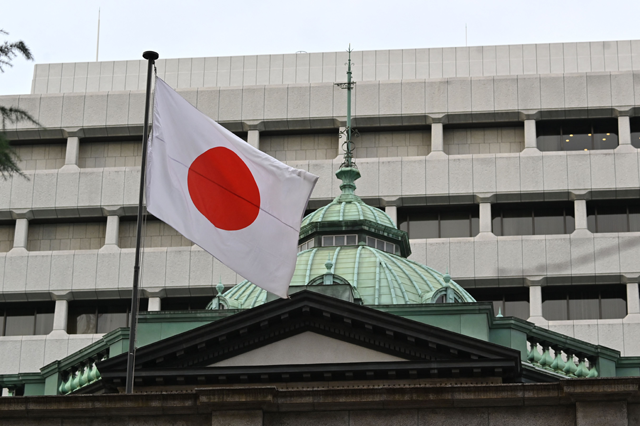You are here
Japan economy shrinks, highlights lack of policy options
By Reuters - Feb 15,2016 - Last updated at Feb 15,2016

Workers take a rest at a park beside a construction site in Tokyo on Monday (AFP photo)
TOKYO — Japan's economy shrank more than expected in the final quarter of last year as consumer spending and exports slumped, adding to headaches for policy makers already wary of damage the financial market rout could inflict on a fragile recovery.
Gross domestic product (GDP) contracted by an annualised 1.4 per cent in October-December, bigger than a market forecast for a 1.2 per cent decline and matching a fall marked in the second quarter of last year, Cabinet office data showed on Monday. It followed a revised 1.3 per cent increase in the previous quarter.
The data underscores the challenges Prime Minister Shinzo Abe faces in dragging the world's third-largest economy out of stagnation, as exports to emerging markets fail to gain enough momentum to make up for soft domestic demand.
Abe sought to reassure markets that Tokyo is ready to stem excessive market volatility that could undermine the wealth effect delivered by his stimulus policies.
"As we have agreed at Group of 7 and Group of 20, sudden currency moves are undesirable. I want the finance minister to closely monitor the situation and respond with appropriate measures as needed," he told parliament on Monday.
Market speculation of additional monetary easing simmers, although the Bank of Japan's (BoJ) policy ammunition appears to be dwindling, analysts say.
"Private consumption is especially weak. The economy is at a standstill," indicated Junko Nishioka, chief economist at Sumitomo Mitsui Banking.
"It's a matter of time before the BoJ and the government will take additional stimulus measures," she said, predicting the central bank will ease policy again as early as next month.
Running out of ammunition?
With his stimulus policies that gave big manufacturers windfall profits, Abe had hoped to generate a positive cycle in which companies raise wages and help boost household spending.
Instead the data showed that private consumption, which makes up 60 per cent of GDP, fell 0.8 per cent, exceeding market forecasts of a 0.6 per cent decline.
Since Abe took power three years ago, private consumption has shrank by roughly 1.5 trillion yen to 306.5 trillion yen ($2.7 trillion).
The economy grew an average 0.68 per cent since Abe's administration took office in 2013, below a 1.8 per cent increase during the opposition Democratic Party's three-year reign.
Offering some hope for policymakers, capital expenditure rose 1.4 per cent, confounding market expectations for a 0.2 per cent decrease.
But analysts doubt whether the economy will gain momentum in coming months, with the recent market turbulence and slowing Chinese growth clouding the outlook for corporate profits.
Exports fell 0.9 per cent in October-December after rising 2.6 per cent in the previous quarter, underscoring the pinch companies are already feeling from soft emerging market demand.
Domestic demand shaved 0.5 percentage point off GDP growth, while external demand, or net exports, added just 0.1 point.
Last month the BoJ cut a benchmark interest rate below zero, stunning investors with another bold move to stimulate growth.
But the shock move has failed to boost Tokyo stock prices or weaken the yen as Japanese markets remained at the mercy of a global equity sell-off.
Separately, the BoJ hopes that cutting interest rates below zero will boost spending and investment, but fear, inertia and years of paltry returns mean the nation's army of savers is unlikely to march to the central bank's tune.
After the BoJ made its move last month to charge banks for holding their reserves from February 16, some retail banks are already cutting their deposit rates, and the rest are expected to follow suit.
Bank of Yokohama Ltd., one of Japan's biggest regional lenders, cut its one-year rate to 0.02 per cent from 0.025 per cent, and Resona Bank, a unit of fourth-largest lender Resona Holdings, halved its rate to 0.025 per cent on five-year deposits.
Central bank governor, Haruhiko Kuroda, aims to break the deflationary mindset that has blighted Japan for decades and get the economy moving, but his compatriots are compulsive savers.
More than half of the $14 trillion in Japanese households' financial assets are either bank deposits or cash, compared with only 13.7 per cent for the United States and 34.4 per cent for the eurozone.
Ryoji Yoshizawa, director at Standard & Poor's Ratings Japan, doesn't think the cuts will change that.
"Interest rates are already very low, so further cuts are not likely to have much impact on depositors," he said.
Tokyo pensioner Kozo Nishimura remembers getting 8 per cent on his savings at Kyowa Bank, which later became Resona, 320 times what the bank pays now on five-year deposits, but he has long since become used to getting scornfully low returns.
"A change of 0.01 points is such a microscopic thing," said Nishimura, 70, who used to own an electronics shop. "For now, I'll just wait and see."
Noriko Ainoya, 71, who runs a shop selling handbags in Sugamo, a Tokyo shopping district popular with the older generation, is equally dismissive of the "dimes and pennies" she gets on her savings.
But the alternatives are too risky.
"I'm scared to keep money under the mattress," she said. "But I don't know about investing, either, since there's no knowing how stocks will move."
Ultimately, Japanese investors value security, remarked a sales official at a major brokerage firm.
"Even if interest rates on time deposits fall from 0.02 per cent to 0.01 per cent, depositors are not losing money. Many people are likely to keep deposits even if interest rates go down to zero," he indicated.
Banks are unlikely, however, to follow Kuroda into negative territory. It would be too unpopular to charge savers, especially the elderly, for holding their money, finance professionals say.
"There have been attempts in the past by banks to introduce charges on deposits, but they failed due to the backlash from retail and corporate clients," said Yoshinobu Yamada, banking analyst at Deutsche Securities in a note to clients.
Some are already at or near the tipping point.
"There's no point in depositing money," said Kiyoshi Ishii, 72, the worried owner of a shop selling rice crackers in Sugamo. "There's no other way than to keep money under the mattress."
That could be music to the ears of companies making something a little more secure than the mattress.
"At this point, the outlook for future sales is unclear," said Akira Kondo, who works at Eiko Kogyo Co., the top maker of safes in Japan. But "there is a chance the sale of safes would rise following TV reports", he added.
Related Articles
TOKYO — The Bank of Japan (BoJ) unexpectedly cut a benchmark interest rate below zero on Friday, stunning investors with another bold move t
TOKYO — The Bank of Japan (BOJ) on Tuesday maintained its long-standing, ultra-loose monetary policy and offered no guidance on its plans in
TOKYO — The Bank of Japan (BoJ) was widely expected to keep its ultra-low interest rates unchanged recently but analysts say the tumbling ye













